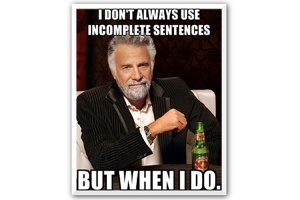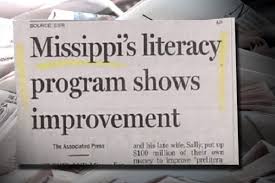My English department recently had a guest speaker talk to us about teaching grammar in the high school classroom. The speaker was a college professor who had his doctorate in something to do with linguistics. I’m sure it was much more specialized than that, but that’s really what I remember. He talked a lot about how grammar, which was once seen as all important, has been almost demonized in our education system. There were years in the early 90’s where almost no grammar was taught at all, and that had a devastating effect on how kids read and write and blah blah blah.
I’m not saying he wasn’t an engaging speaker (actually, he was incredibly entertaining!)… I just don’t necessarily want a grammar history lesson. It doesn’t seem to have anything to do with how to actually teach writing or speaking. Then he said something that really stuck with me:
We all speak several different languages every day.
Wow. He’s right. And subconsciously, I knew that. I know that the way I am “speaking” on this blog is not the same as the way I speak when I text, or email, or give a presentation, or a million other ways that I communicate every day. But I never thought of it as a whole separate language before.
I loved the way that he described our different communication styles as new languages so much, that I told my students all about it that same day. We are, after all, just beginning a formal, persuasive research paper. We had talked about grammar a little bit (as much as my very limited knowledge of how to teach grammar and not bore the pants off my kids would allow) and even talked at length about why writing well matters for the future, but it wasn’t really coming across to them why they had to use certain words in their writing, or omit certain words, or not use text speak, etc.
As we had our class conversation on speaking different languages though, in a moment of true teaching how-did-I-think-of-that-just-now awesomeness, I said that writing a formal essay is like speaking our “smarter” language. So we can’t use words like can’t, because that’s how the every day us would speak. And we can’t say your or I, because we have to find a way to elevate our language, and make a point without making ourselves the center of everything, or generalizing that you will always agree with me, or pandering to our audience.
Essays, college applications, job applications, cover letters – they’re all our smarter language. “Speaking” through those mediums is the way that we want people to perceive us. We’re intelligent, we’re articulate, we’re educated, and so much more. We’re better than that other guy who made seven spelling errors and used incomplete sentences. Hire us instead. Let us into that highly competitive program instead.
Good writing matters. It sets us apart from others. It makes us the smarter versions of us. And who wouldn’t want that?
Until next time,
Kayla
In a more lighthearted look at how writing matters, I showed my class the following Grammar Fails presentation. If someone does use it, could you let me know! I would love to see if other kids enjoy it as much as my students did!! Thanks!


